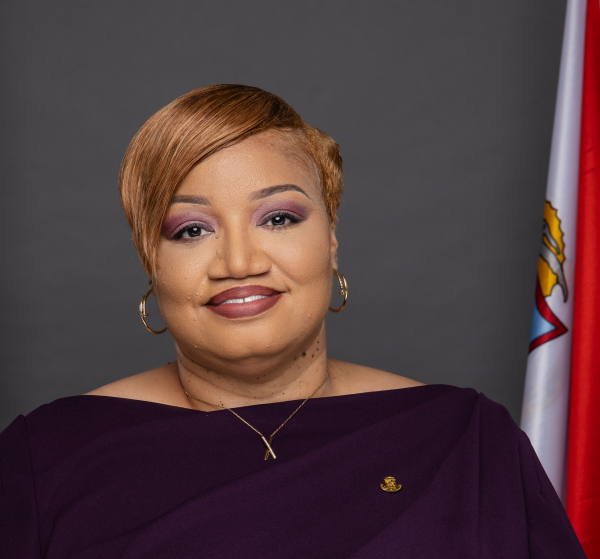A St. Martin Day Message by Minister of Finance, Marinka Gumbs
 Fellow St. Martiners,
Fellow St. Martiners,
Residents of our beloved island,
Brothers and Sisters
Happy St. Martin Day!
This St. Martin Day 2026, we celebrate more than a borderless territory; we celebrate a unique, resilient spirit that transcends administrative divisions. This day is a testament to the wisdom of our ancestors who forged a peaceful, shared existence. Yet, we must ask ourselves some tough questions and tell ourselves some home truths.
Is our unity merely a symbol, or is it an active engine for progress and fiscal responsibility? Do we really live the unity our ancestors demonstrated in their daily lives or is it something we only proclaim ritually one day out of the 365 days in the year?
For too long, the idea of unity has been treated primarily as a cultural or historical legacy. In 2026, facing global economic pressures and the ever-present threat of climate instability, I am of the opinion that we must elevate this unity into a binding, operational principle for how we govern our island, how we spend our meager finances, and how we invest our very limited resources. Our destiny is indeed one - that is undeniable, but unfortunately, our financial strategies on both halves of the island do not reflect that reality.
In practically everything we do the first place we look for solutions is outside the island. We seldom look at each other at all for possible joint responses, strategies, or ventures. Cooperation between us is far from what it should be even as neighbors not to mention as family.
The Cost of Duplication
I am sure every citizen, whether paying taxes in Great Bay or Marigot, shares the same expectations for efficient governance and high-quality public services. However, the reality is that maintaining two entirely separate administrations on an island this size is fundamentally inefficient. We are constantly paying what I would like to call a "duplication tax"— spending resources to acquire, maintain, and staff two separate systems when one coordinated system would suffice.
Those who partitioned the island did it for their own interests, leaving us to pay lip service to the idea of unity and cooperation especially on this special day. Well, this year, we should proclaim that the time for symbolic cooperation is over. We must now embed the principle of mutual consultation and close collaboration into our daily operations. Our unity must be the basis for achieving tangible economies of scale that reduce the burden on our taxpayers and free up critical budget space for future investments.
Priority Areas for Fiscal Cooperation
The greatest opportunities for maximizing savings and cost-effectiveness lie in harmonizing core public services and infrastructure that serve every resident, regardless of which side they live on. I would like to propose three immediate areas where joint effort could yield substantial, verifiable fiscal benefits for both our administrations:
1. Joint Procurement and Supply Chain Management
One of the quickest paths to savings is through our purchasing power. When buying essential items—from computers for our schools to high-cost pharmaceuticals and specialized medical equipment for our hospitals—we currently operate as two small and distinct entities. This results in us paying higher prices than necessary.
By establishing a Joint Procurement Body, both administrations could pool their annual needs and enter the market as a single, larger purchaser. This would secure significant volume discounts, reduce the complexity of our supply chains, and lower the overall cost of critical public services like healthcare and education.
The savings here can be immediate and measurable, offering instant relief to both our national budgets. After all, if businesses in the private sector can do it, I would like to think that our governments should be able to do it also.
2. Waste Management and Environmental Infrastructure
The challenge of waste and the related financial and environmental risks are perhaps the most visible examples of fragmented planning. Maintaining two distinct solid waste management infrastructures, often leading to unsustainable practices, is an extraordinary, long-term financial liability for both sides.
A joint approach—such as the creation of a Unified Waste-to-Energy or Advanced Recycling Facility, governed by a mutually established authority—would allow us to share the massive capital expenditure and the ongoing operational costs.
This single, optimized investment would replace two expensive, duplicated systems, saving both governments millions in maintenance, landfill remediation, and environmental compliance costs over the next decade.
3. Disaster Resilience and Public Safety Assets
When a hurricane or a major crisis hits, the entire island suffers. Indeed, as Felix Choisy of immortal memory famously said, the gale does not stop at the frontier. Disaster preparedness should, therefore, be an inherently island-wide concern. Currently, both sides invest heavily in large, costly emergency assets: specialized communication networks, disaster supplies and the like.
By sharing the acquisition and maintenance of high-cost, low-frequency-use assets—such as large generators, or high-capacity pumps—we could reduce the capital expenditure burden on both treasuries.
Furthermore, a Unified Crisis Management Protocol guarantees faster, more efficient deployment of personnel and equipment across the island, which directly reduces the economic cost of downtime and accelerates overall recovery, providing an invaluable fiscal benefit to both governments.
Our Shared Future
This St. Martin Day, let us commit to making the unity we celebrate actually work in our best interest. Our cooperation should not be seen as a political negotiation; it is, in my humble view, a financial imperative that must be rooted in sound economic planning and good stewardship of the public purse.
By consulting closely, sharing assets strategically, and investing jointly, we would reinforce our resilience and ensure that every euro and every guilder spent works harder and better for all the people of St. Martin.
May this St. Martin Day mark the beginning of our most cost-effective and prosperous chapter yet.
Happy St. Martin Day to one and all.
Ms. Marinka Gumbs,
Minister of Finance, Sint Maarten